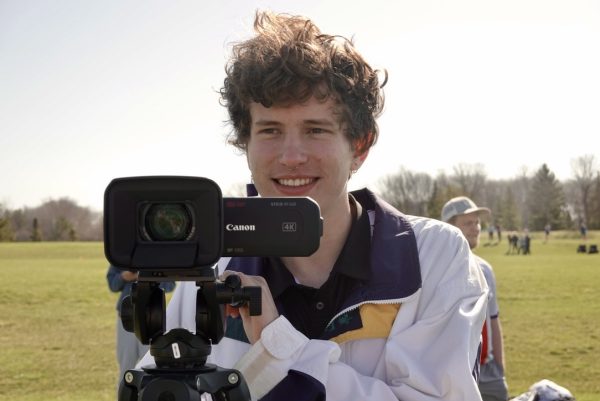President Suzanne Rivera was expected to attend Macalester College Student Government’s (MCSG) weekly public Legislative Body (LB) meeting on Thursday, Nov. 21 to answer questions posed by students on important topics across campus. What she, and the broader community, hadn’t expected? A statement two hours before the meeting announcing the Board of Trustees (BoT) ad hoc committee’s decision to vote against Mac for Palestine’s divestment proposal.
Many community members weren’t expecting this decision to come until closer to Dec. 11, the BoT’s self-set deadline. Usually LB meetings, although open to the general public, don’t see more than a few interested community members. However, last week’s meeting in the Weyerhaeuser Board Room drew the attention of Mac for Palestine and many students looking to hear more about the Board’s unanimous decision from Rivera, one of its voters.
President Joel Sadofsky ’25 started off the Q&A with a quick introduction to explain that Rivera’s appearance is part of MCSG’s series of inviting members of the senior leadership team (SLT) in an effort to bridge gaps between administration and the broader student body. Sadofsky explained that with the unexpected announcement from earlier that day, many of the questions had been modified in scope, and new questions added.
Rivera, before answering questions, quickly noted that the decision’s timing was a surprise to her as well.
“We didn’t know that this was going to be the day that the Board’s decision would be released when I accepted the invitation to appear,” Rivera said.
Regardless, she explained she would answer any questions, adding the caveat that she could only speak for herself and her decision to vote against Mac for Palestine’s divestment proposal, not the BoT itself.
The first question came from senior class representative Sylvia Coyle ’25.
“How does the decision to reject divestment align with Macalester’s stated commitment to global citizenship, social justice and supporting human rights?” Coyle asked.
Rivera responded by explaining that “it was our feeling, a unanimous decision of the trustees, that investing resources in trying to make change would have greater impact and be more aligned with the institutional mission than the divestment proposal that was put in terms.”
Academic Affairs Committee (AAC) Chair Tristan Niedzielski ’25 followed and asked how this differed from past forms of divestment, specifically Macalester’s divestment efforts against apartheid in South Africa and divestment from fossil fuel companies, in 1978 and 2019 respectively.
Rivera compared the direct investment Macalester had in fossil fuel companies to the indirect investment Macalester had in seven out of the 11 companies mentioned in the Mac for Palestine proposal. Rivera explained that while direct investments were those made towards a specific company, indirect investments were those made through specific funds, which are composed of many companies and include specific companies in the divestment proposal.
Rivera did not comment on Macalester’s divestment against apartheid in South Africa, as she was not at Macalester when that decision was made.
Vice President Ryan Connor ’25 followed up later with a question in response to Rivera’s answer.
“A large part of the decision not to divest is on the ‘negligible’ indirect 0.2% exposure to the companies in question,” Connor said. “So, how do you or the Board quantify the potential financial risk of divesting such a small percentage compared to the reputation of more moral implications of retaining those investments?”
Rivera responded by restating that the indirect funds, being wrapped up in larger funds, are much harder to divest from.
“You would have to take all of our money out of that mutual fund to avoid exposure for those small numbers of stocks,” Rivera said.
Questions later in the Q&A pushed this answer further.
“How do you rationalize investing in genocide, even indirectly, [in] companies that are implicit in genocide and apartheid?” Niedzielski asked.
“I don’t think I’m going to be able to give you an answer that’s going to satisfy you in the way that that question was asked,” Rivera answered. “The college doesn’t set out to invest in harm. The Board made a decision about a proposal that was put in front of it that it thinks is aligned with our values, and I think the statement speaks for itself.”
After this statement, River clarified that she did not consent to anyone video recording the public meeting with the intention to post it on social media. The questions continued.
“I know there was a lot of student faculty support, which the Board noted in their decision,” first-year representative Lina Solh ’28 said. “How does the Board and then you, in your position, reconcile this decision with the principle of shared governance and listening to the community?”
Rivera emphasized the avenues of feedback the ad hoc committee created for students, and the fact that not every student at Macalester shared the same beliefs. For Rivera, the Board did an adequate job of listening to all feedback, and providing a solution that stood in line with the principle of shared governance.
The meeting transitioned into questions brought by non-LB members, beginning with Mac for Palestine organizer OSB ’26, who presented a speech on behalf of Mac for Palestine about the recent decision. In their statement, OSB brought up similar concerns to previous LB questions and argued that the decision was one contrary to what the Macalester community had asked for.
“They have chosen their side, and it’s not with the students, the faculty or the staff — it’s with the corporations that profit from war and occupation,” OSB said. “In an attempt to justify their complicity, the Board has raised their decision as an investment in peace. Let’s be clear: funneling money into scholarships and dialogue while continuing to profit from systems of the violence and dispossession is not peacemaking. It’s performative, hypocritical and grotesque.”
OSB finished their speech by stating Mac for Palestine’s plan for moving forward: a petition for a vote of no-confidence in the BoT.
“The time for back room deals and unaccountable decision making is over,” OSB said. “The Board has shown they cannot be trusted to uphold the values of this college. It is time for the people who make up Macalester — those who learn here, work here and teach here — to take back control.”
More questions were asked, one specifically relating to future transparency about Macalester’s investments. Rivera stated that plans were in progress.
“I have already offered to meet with the student liaison to the Board Gabe Karsh [’25] earlier today to get input about what would be the methods that students would appreciate most for how to get information about the endowment,” Rivera said.
The LB also posed questions that didn’t pertain directly to the BoT’s decision. Questions about the U.S. Supreme Court reversal of affirmative action, updates to the strategic plan and the potential impact of President-Elect Donald Trump’s administration making legal threats towards colleges prioritizing equity and inclusion.
“We are already beginning to do work, including seeking legal counsel about the extent to which any new policies might affect the college,” Rivera said. “But it’s our intention to do everything we can to continue to promote the college’s values to the extent it’s possible.”
As Rivera exited the meeting, Mac for Palestine representatives, joined by some LB members, chanted “Free, Free Palestine.”
After the Q&A, Sadofsky continued the divestment discussion, stating first that it no longer seemed proper for the scheduled discussion and voting on MCSG’s resolution on divestment. Niedzielski stated plans for a new resolution in light of the BoT decision.
Next were Cabinet updates, with Dining and Residential Life Liaison Galjer Yangwaue ’27 announcing there would be on-campus housing available for rising juniors and seniors. International Student Liaison Laurice Jimu ’27 explained that he is working for better ways to communicate with international students.
“Currently what’s happening is, if I need to talk to international students, I have to go through ISP and right now, that model has not been super great,” Jimu explained. “So I’ll be talking with the cabinet about this to see how best we can structure a direct line of communication.”
Athletics and Recreation, presented by Peterson in light of Athletics & Recreation Liaison Jordan Galloway’s ’26 absence, talked about Green Athletics Club’s first meeting, and their installation of a terracycling bin by Scotty’s to reuse non-compostables and non-recyclables like chip bags and candy wrappers. She also explained that Galloway’s absence was due to him working with the Student Athlete Advisory Committee (SAAC) to update their website.
The meeting finished up with updates from Committees.





